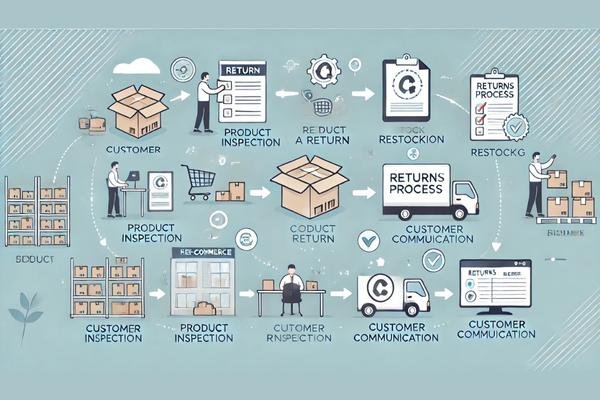
Top 5 E-commerce Platforms for Multi-Channel Selling
October 2, 2024
Best Free Online Store Platforms for 2025
October 2, 2024Best E-commerce Platforms with Advanced SEO Features for 2025
Search engine visibility can make or break an e-commerce business. In 2025, e-commerce platforms are evolving to offer more advanced SEO tools that cater to developers, digital marketers, and content creators. This article will guide you through the best e-commerce platforms that come equipped with the most advanced SEO features, making them indispensable for businesses aiming to increase organic traffic and improve search engine rankings.
Let’s dive into the top platforms and why they stand out.
Table of Contents
1. Shopify: User-Friendly with Robust SEO Tools
Shopify is renowned for its user-friendly interface, but it also offers some of the most robust SEO tools in the e-commerce industry. Whether you’re a seasoned developer or a digital marketer just getting started, Shopify’s built-in SEO features make it an ideal platform for any level of expertise.
Key SEO Features:
- Automatic XML Sitemap: Shopify automatically generates an XML sitemap to help search engines index your pages more efficiently.
- Customizable Meta Tags: Easily edit title tags, meta descriptions, and image alt texts to improve search visibility.
- Mobile Optimization: All Shopify themes are mobile-responsive, which is crucial for SEO as search engines prioritize mobile-friendly websites.
- SEO Apps: Shopify’s app marketplace offers a wide variety of SEO apps, like Plug In SEO and SEO Manager, to further enhance your store’s search rankings.
Pros:
- Simple to set up and optimize even for beginners.
- Seamless integration with SEO-focused apps.
- Built-in analytics to track search engine performance.
Cons:
- Customizing SEO beyond basic features requires additional apps or developer help.
- Higher transaction fees unless you use Shopify Payments.
Best for:
Small to medium-sized businesses that need an intuitive platform with built-in SEO features and access to additional SEO tools through apps.
2. BigCommerce: Best for Built-In SEO Capabilities
BigCommerce is an e-commerce platform designed with scalability and advanced SEO tools in mind. Unlike Shopify, many of BigCommerce’s most powerful SEO features are already built into the platform, making it an ideal choice for businesses that want robust SEO capabilities without relying heavily on third-party apps.
Key SEO Features:
- Custom URL Structures: BigCommerce allows you to customize your URL structure, which is crucial for optimizing your site for specific keywords.
- Accelerated Mobile Pages (AMP): BigCommerce supports AMP, which ensures that your mobile pages load faster, improving both user experience and search rankings.
- Automatic Image Optimization: BigCommerce automatically compresses images to improve site speed, a key factor in SEO.
- Rich Snippets Support: The platform supports rich snippets, allowing you to enhance your search listings with reviews, pricing, and other rich data, which can increase click-through rates.
Pros:
- Strong out-of-the-box SEO capabilities.
- No transaction fees, unlike some competitors.
- Fast loading times thanks to automatic image compression and AMP support.
Cons:
- The learning curve can be steep for beginners.
- Fewer third-party SEO apps compared to platforms like Shopify.
Best for:
Growing businesses that want a platform with extensive SEO features built-in, allowing for more advanced optimization without the need for additional plugins or apps.
3. WooCommerce: Best for WordPress Users
If you’re already using WordPress, then WooCommerce is an excellent choice for setting up an SEO-friendly online store. As a WordPress plugin, WooCommerce benefits from all of WordPress’s SEO tools and plugins, making it one of the most flexible and customizable platforms for SEO.
Key SEO Features:
- Full Control Over SEO: Since WooCommerce is built on WordPress, you have full control over every SEO element, from URL structures to meta tags.
- Yoast SEO Integration: WooCommerce works seamlessly with the Yoast SEO plugin, which is one of the most popular SEO tools for WordPress. Yoast helps optimize everything from meta descriptions to keyword usage.
- Customizable Permalinks: You can adjust permalinks for better keyword optimization, which is crucial for improving search engine rankings.
- Blog Integration: Since WooCommerce is a WordPress plugin, it integrates naturally with your blog, allowing you to easily create SEO-rich content that drives traffic.
Pros:
- Complete control over SEO settings.
- Seamless integration with powerful WordPress SEO plugins.
- Open-source platform with unlimited customization options.
Cons:
- Requires technical knowledge for setup and ongoing management.
- You need to handle your own hosting, which can impact site speed (a crucial SEO factor).
Best for:
Businesses and developers already using WordPress who want maximum control over their SEO efforts.
4. Wix eCommerce: Best for Small Businesses with Limited SEO Knowledge
Wix has come a long way in terms of SEO, and its eCommerce platform now offers a variety of features that make it easy for small businesses to improve their search rankings without needing in-depth SEO knowledge.
Key SEO Features:
- Wix SEO Wiz: This tool provides step-by-step guidance on optimizing your website for search engines, making it perfect for users with little SEO experience.
- Customizable Meta Tags: Wix allows you to easily customize title tags, meta descriptions, and image alt texts to optimize your store’s search visibility.
- Mobile Optimization: Wix’s templates are mobile-responsive, which ensures your site is optimized for mobile search.
- Automatic Structured Data: Wix automatically includes structured data (schema markup) for your store, helping search engines understand and display your product listings more effectively.
Pros:
- Easy to use with no technical knowledge required.
- Guided SEO setup with Wix SEO Wiz.
- Affordable pricing for small businesses.
Cons:
- Limited customization options compared to platforms like WooCommerce.
- Lacks some advanced SEO features, such as full URL control.
Best for:
Small businesses that want an easy-to-use platform with basic SEO tools that guide users through the optimization process.
5. Squarespace: Best for Creatives with Built-In SEO Tools
Squarespace is well-known for its stunning designs, but it also offers built-in SEO features that make it a solid choice for creatives and service-based businesses looking to optimize their online stores.
Key SEO Features:
- Automatic Mobile Optimization: All Squarespace templates are mobile-responsive, which is a major factor for SEO.
- Customizable Meta Tags: You can easily edit title tags, meta descriptions, and alt texts.
- Built-in SSL: All Squarespace sites include SSL certificates, which are crucial for secure, SEO-friendly websites.
- SEO Analytics: Squarespace offers built-in analytics tools that help you track how well your store is performing in search engines.
Pros:
- Beautiful, mobile-responsive templates.
- Simple SEO management for non-technical users.
- All-in-one platform with built-in security (SSL) and analytics.
Cons:
- Less flexibility for SEO customization compared to platforms like WooCommerce or BigCommerce.
- Higher pricing tiers for advanced e-commerce features.
Best for:
Creatives and small businesses that prioritize design and ease of use but still want effective SEO tools built into the platform.
Best E-commerce Platforms with Advanced SEO Features for 2025 Comparaison
Best E-commerce Platforms with Advanced SEO Features for 2025
| Platform | Key SEO Features | Best For | Link |
|---|---|---|---|
| Shopify |
– Automatic XML sitemaps – Customizable meta tags and image alt text – Mobile optimization and SEO apps integration | Small to medium-sized businesses | Visit Shopify |
| BigCommerce |
– Custom URL structures – AMP support for faster mobile pages – Rich snippets for enhanced search listings | Growing businesses with advanced SEO needs | Visit BigCommerce |
| WooCommerce |
– Full control over SEO with WordPress plugins – Yoast SEO integration – Customizable permalinks and blog integration | Businesses already using WordPress | Visit WooCommerce |
| Wix eCommerce |
– Wix SEO Wiz for guided optimization – Customizable meta tags and structured data – Mobile-responsive templates | Small businesses and beginners | Visit Wix eCommerce |
| Squarespace |
– Automatic mobile optimization – Built-in SSL and SEO analytics – Easy customization of meta tags | Creatives and service-based businesses | Visit Squarespace |
Frequently Asked Questions
1. What is the best e-commerce platform for SEO?
For most businesses, BigCommerce and WooCommerce offer the most advanced SEO features. BigCommerce is ideal for businesses that want powerful built-in SEO tools, while WooCommerce is best for those who want complete control over their SEO.
2. How important are mobile-optimized sites for SEO?
Very important. Google prioritizes mobile-friendly websites in its rankings. All the platforms mentioned in this article, like Shopify, Wix, and Squarespace, offer mobile-optimized templates, which will improve your site’s SEO performance.
3. Do I need additional SEO tools with these platforms?
While many of these platforms offer built-in SEO tools, additional plugins or apps like Yoast SEO for WooCommerce or SEO Manager for Shopify can enhance your store’s SEO and provide more advanced options for optimization.
Conclusion
Choosing the right e-commerce platform with advanced SEO features is essential for growing your business in 2024. Each platform mentioned—Shopify, BigCommerce, WooCommerce, Wix, and Squarespace—offers a unique set of tools tailored to different business needs. Whether you’re a small business looking for ease of use or a developer seeking full control over SEO customization, there’s an e-commerce platform that fits your needs.
Make sure to consider your business goals, technical skill level, and SEO priorities when selecting a platform. By choosing the right platform with advanced SEO features, you can boost your search rankings, attract more customers, and ultimately grow your e-commerce business.








